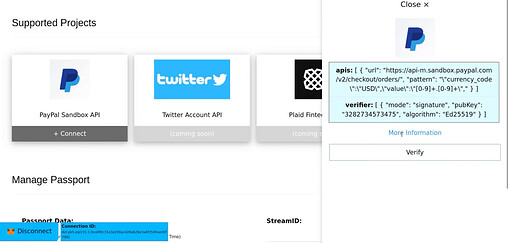Grant/Project Name: CentiID
Proposer’s contact info: origo.liberty@gmail.com
Grant Category: Apps
ELI5 Project Summary:
CentiID enables a user to build its digital identity from arbitrary web data. It allows users to bootstrap verifiable credentials from data only they have access to, and leverages Ceramic as a storage solution. The collection of credentials maintained by a user can represent its digital identity and associate a reputation.
Project Description:
This grant aims to develop CentiID, a tool that integrates a data provenance service into the Ceramic ecosystem. With CentiID, a user can query an external API, receive a response from the server and further receive a signed credential, which attests to a specific value in the response obtained from the API. For example, a user may receive a Verifiable Credential, which attest to a donation made via PayPal. In this project, we aim to integrate “Origo”, our service for data provenance, into Ceramic in order to provide users with credentials that enhance their reputation. As such, CentiID is similar to Gitcoin Passport - with the caveat that CentiID is able to issue credentials from private, arbitrary data - without harming confidentiality.
CentiID will adapt gitcoinco/passport-sdk-reader and the gitcoinco/passport-sdk-writer to the new Ceramic data model based on ComposeDB and Ceramic composites. To add support for DID compatible data streams that host W3C verifiable credentials, CentiID optionally consider the integration of the Sphereon/rn-vc-js package. To connect to a local Ceramic network, CentiID will rely on self.id/framework. The end-result of this grant will be a PoC, demonstrating the feasibility of our solution and laying the groundwork for future integrations beyond verifiable credentials.
Relevant links:
- Website: origodata.io
- Twitter: @OrigoLabs
- Github: GitHub - origodata/ceramic-integration
- Previous projects the team has meaningfully contributed to**:**
- Comparable projects or peers: Gitcoin Passport
Ceramic Ecosystem Value Proposition:
What is the problem statement this proposal hopes to solve for the Ceramic ecosystem?
- Data in Ceramic has no proof of authenticity. We aim to change that, starting with Verifiable Credentials from arbitrary web data with a verifiable source.
How does your proposal offer a value proposition solving the above problem?
- Our proposal aims to solve this problem by developing a PoC, connecting Origo, our tool for proving data provenance, to Ceramic.
Why will this solution be a source of growth for the Ceramic ecosystem?
- CentiID allows verifiable credentials, issued from private data, to be stored on Ceramic and therefore enable a more lively decentralized identity ecosystem.
Funding requested (DAI/USDC): [$16,000]
Milestones:
-
Milestone #1: Ceramic Data Provenance Architecture (3 weeks) - [$5,600]
- [Design System architecture] - [25 Hours - 80 $/ Hr]
- [Ceramic write and read flow] - [15 Hours - 80 $/ Hr]
- [Frontend architecture] - [15 Hours - 80 $/ Hr]
- [Origo backend architecture] - [15 Hours - 80 $/ Hr]
-
Milestone #2: Develop PoC (5 weeks) - [$10,400]
- [Local Ceramic deployment & composeDB graphQL objects] - [35 Hours - 80 $/ Hr]
- [Frontend implementation] - [25 Hours - 80 $/ Hr]
- [Backend implementation (Origo connection)] - [35 Hours - 80 $/ Hr]
- [Integrated demo Application] - [35 Hours - 80 $/ Hr]
I accept the 3Box Labs Grants terms and conditions: [Yes]
I understand that I will be required to provide additional KYC information to the 3Box Labs to receive this grant: [Yes]
